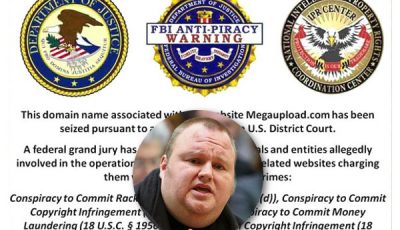Appeals Court Approves Seizure of Dotcom Funds
 RICHMOND, Va. – A U.S. federal appeals court on Friday ruled the U.S. government may seize about $75 million from accused internet piracy kingpin Kim Dotcom. The money currently is under seizure in Hong Kong and New Zealand.
RICHMOND, Va. – A U.S. federal appeals court on Friday ruled the U.S. government may seize about $75 million from accused internet piracy kingpin Kim Dotcom. The money currently is under seizure in Hong Kong and New Zealand.
Since 2012, Dotcom has been fighting extradition from New Zealand to the U.S. to face charges of internet piracy, racketeering and money laundering associated with his Megaupload file-sharing empire. Prosecutors say the business produced about $175 million from user fees and ads between its founding in 2005 and its seizure by the U.S. government in 2012. During that time, Megaupload allegedly caused an estimated $500 million in damages to the motion picture industry.
In 2014, U.S. prosecutors moved to seize Dotcom’s funds in Hong Kong and New Zealand in order to protect the assets it believes should be forfeited as a consequence of criminal enterprise. Both countries have allowed Dotcom to withdraw millions of dollars from the seized accounts for living and legal expenses. In addition, the New Zealand seizure order was set to expire after three years. Neither country has objected to the U.S.’s seizure effort.
The U.S. won a default civil judgment in federal court last year when Dotcom failed to appear. Dotcom appealed the ruling, arguing a federal statute that prevents fugitives from defending property against government forfeiture actions in absentia violates due process rights. A three-judge panel of the Fourth U.S. Circuit Court of Appeals denied Dotcom’s petition, saying he gave up the right to contest civil judgments when he refused to stand trial on the related criminal charges.
“[T]he claimants’ argument that they have legitimate reason to remain where they are, such as jobs, businesses, and families, does not disprove that avoiding prosecution is the reason they refuse to come to the United States,” Chief Judge Roger L. Gregory wrote in the court’s opinion. He called Dotcom’s argument “utterly unpersuasive.”
Dotcom’s next step, if he wishes to take it, is to request an en banc hearing before the entire panel of judges in the Fourth Circuit. If the court rejects the request, he may appeal to the U.S. Supreme Court.
Dotcom faces an extradition hearing before New Zealand’s highest court later this month. In December 2015, a lower New Zealand court ruled Dotcom could be extradited. He appealed the ruling.












